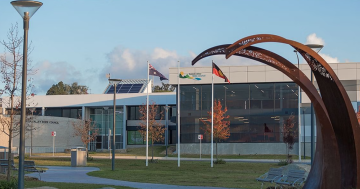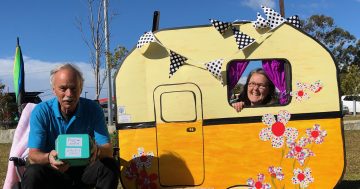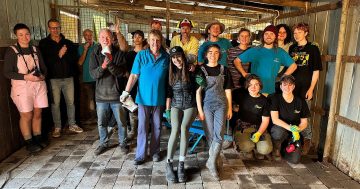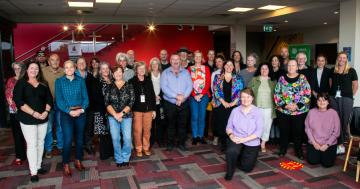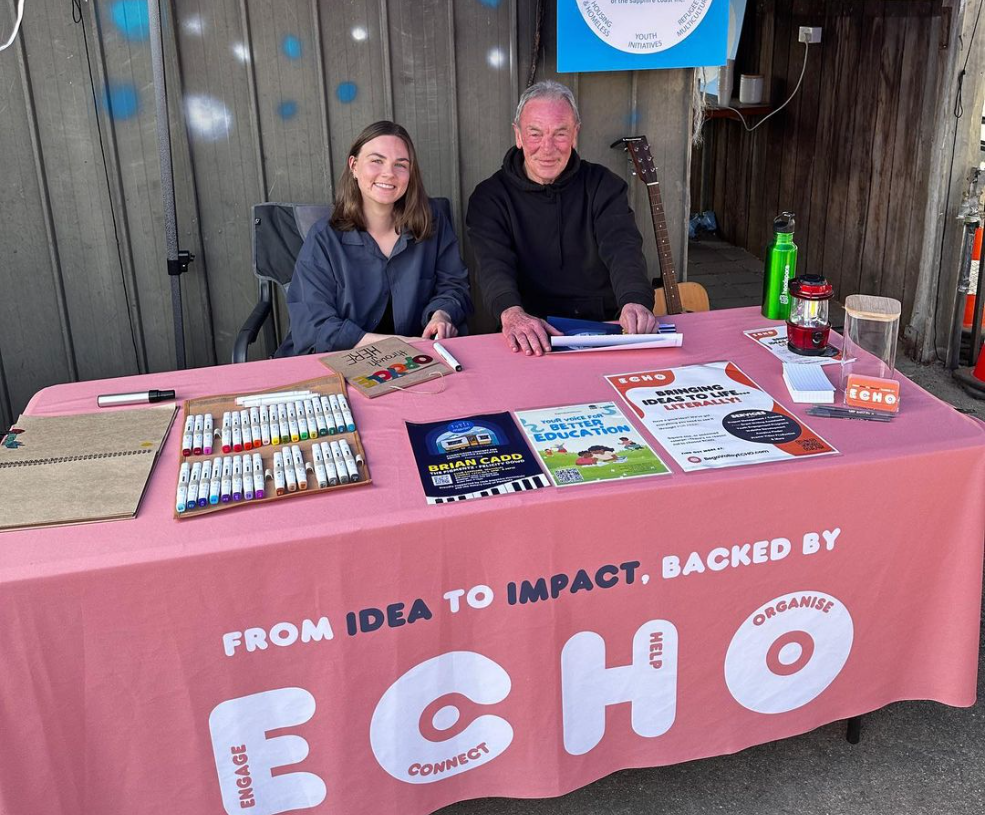
Two members of Social Justice Advocates of the Sapphire Coast at the Grow the Future Farm in Bega. Bega Valley ECHO is a business that Jack Gray started six months ago. Photo: Jack Gray.
Jack Gray is no ordinary 21-year-old. He was instrumental in setting up a youth sub-group of not-for-profit Social Justice Advocates of the Sapphire Coast (SJASC) and runs his own business that empowers young people to bring their great ideas to life.
Mr Gray is also one of 12 people who the Department of Education selected from a pool of 400 to survey high school students on the issues they face.
He came across SJASC while at Lumen Christi High School where SJASC started a chapter around six years ago. He and Lucy Little became the convenors. After Mr Gray and Ms Little left school they joined a group called Youth Climate Action Collective that their friends had formed a few months earlier.
“We just happened to have so much alignment with SJASC that we combined the chapter at Lumen Christi and the Youth Climate Action Collective to form a new dedicated SJASC sub-group,” Mr Gray said.
In less than 12 months it has grown to have 40 members, with around half of those balancing work, study and building their lives while doing SJASC’s community work in the Bega Valley Shire. Next term they hope to bring students from Eden Marine High School into the fold. Students from Bega High School and Sapphire Coast Anglican College are next in their sights.
The youth sub-group’s two main focus areas are environmental issues and providing opportunities for the shire’s youth. It sees youth as critical to the long-term sustainability of not-for-profit community organisations in the area.
“Diminishing youth engagement is a big problem,” Mr Gray said.
The sub-group works to promote equal opportunities for young people and is passionate about promoting youth professionals. It hosts events where they can use young graphic designers and photographers, for example, and looks for opportunities for young professionals to work at events of other organisations.
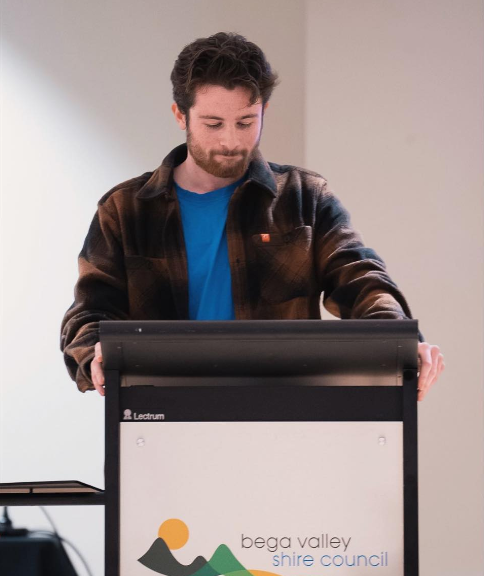
Jack Gray presenting a speech at the Civic Centre in Bega during the Costa Circularity Forum. Photo: Zach Hooker Photography.
The youth sub-group brings the number of SJASC arms to seven. Homelessness and housing, climate and environment, Indigenous affairs, international, notably advocacy for Timor Leste, and refugees are its other sub-groups, along with a Bega group that assists the shire’s migrants and refugees. Last year it also worked on the referendum on a Voice to Parliament.
Mr Gray was studying for a diploma in mental health but has put that on hold to run his own youth-focused business, Bega Valley ECHO. He has been working on the idea for two years and got the concept facilitation service running six months ago.
ECHO stands for engage, connect, help and organise. At its heart ECHO helps young people make their great ideas a reality. It provides young people with everything they need so that their idea has the impact it is intended to.
It provides promotional materials, helps with application and website development, and offers a free grant writing service.
“I have flipped that grant writing process on its head,” Mr Gray said.
Paying thousands of dollars for a professional grant writer is risky for young project managers and individuals with an idea but no funding. Mr Gray takes on that risk himself. He is only paid if the grant application succeeds. “I put a facilitation fee into the grant itself,” he said.
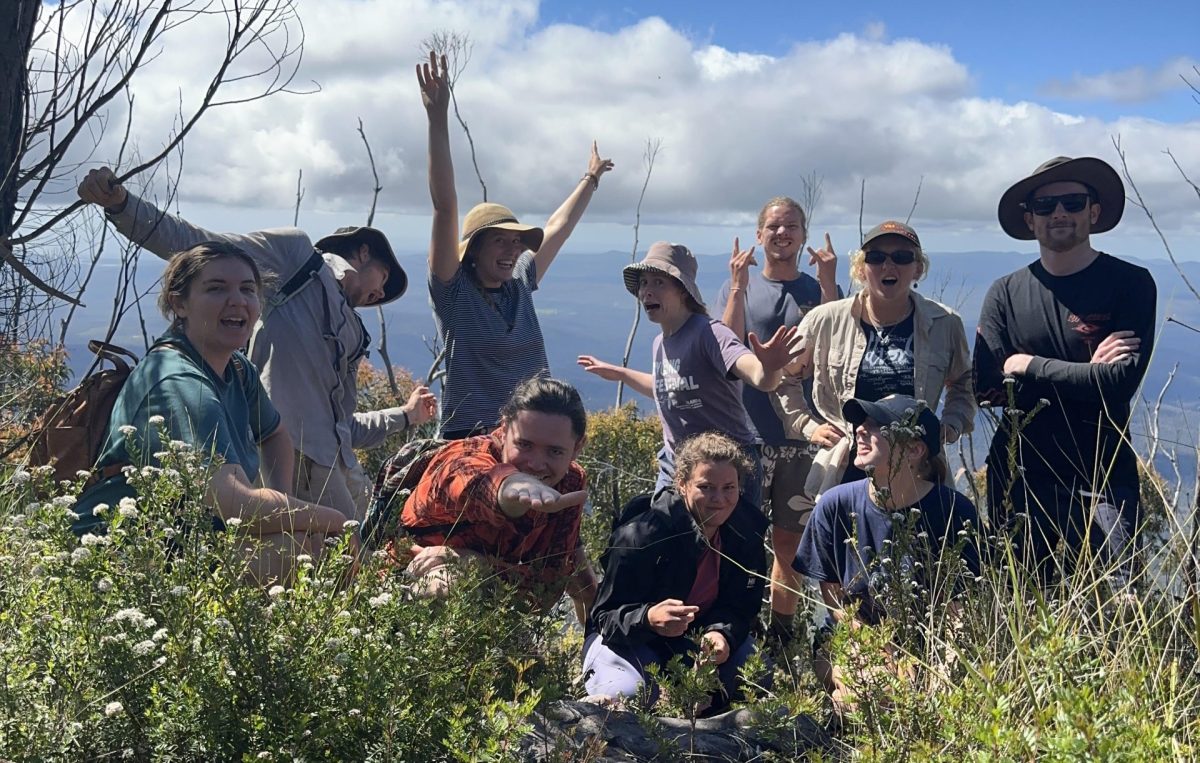
Members of the Social Justice Advocates of the Sapphire Coast youth sub-group hiking up Mount Imlay. Photo: Jack Gray.
He stresses the ECHO system is available to anyone with a good idea. “There is money everywhere, but the most valuable thing is a good idea,” Mr Gray says. “I wanted to create a system that allows people with a great idea to have the best possible chance to have it become a reality.”
That is why the service is free.
His clients have the option to do the work themselves or give ECHO permission to self-fund.
“We take their idea, apply for grants and self-fund the whole process,” Mr Gray said. “That way it is completely free for the client until the idea or project is implemented.”
Mr Gray also has a 12-month contract with the Department of Education to survey students in Years 10 to 12 in the Eurobodalla and Bega Valley shires on what they think is the biggest issue facing young people today.
His survey found that drug and alcohol addiction was by far the most important issue for the Far South Coast’s youth. Anxiety and depression were a very distant second, followed by economic concerns like housing and employment.
In contrast, across the state, students identified undue pressure to go to university. “We presented a few different budget proposals for reallocation of resources for career advisors and teachers in terms of support for other pathways.”
Anyone interested in joining SJASC’s youth sub-group can reach them through social media and [email protected]







